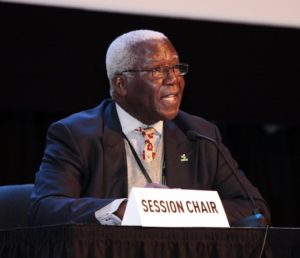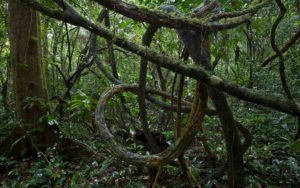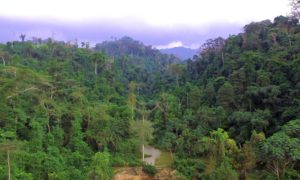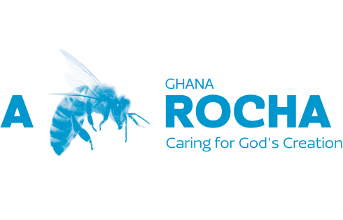The Problem with the Inclusion of Atewa Mountain in the Ghana-Chinese Deal

Prof. Alfred Apau Oteng-Yeboah
My first ever formal Geography lessons in class started in 1960 at Abuakwa State College (ABUSCO), Kibi. I was in secondary Form One and the teacher was Mr Kwaku Darko (later Dr Kwaku Darko). He introduced to us the Kibi landscape including the Atewa-Atweredu range of mountains which jotted the outskirts of Kibi, ranging from Apedwa in the south to Asiakwa/ Sagyimase to the north. It was later Mr. Adams, our Physical Education or Sports Master, who, after getting us to jog at dawn from the school compound on the main Accra-Kumasi road towards the outskirts of Potroase near Amanfrom/Wirenkyiren, made us to sketch the road network used for the jogging. The location of Atewa-Atweredu mountains were always featured.
It was from this time that I drew lots of inspiration for and became closely associated with the beauty of the Atewa landscape, which was always covered in clouds, making it the only remaining upland evergreen and cloud forest in Ghana. This forest range forms part of the Guinean-Congolean forest stretch that characterized the West African Region until it was disrupted over the last six decades by excessive land-use and land-use cover change including agriculture and urbanization. It was much later in life that I became aware of the following features associated with this geographically important site: the knowledge about a small tributary of River Birim (called River Bannin) running near Apapam, which is highest in authority of all the river deities mentioned during libation pouring for the commencement of the Ohum festival for the Akyems by the Akyem Tafohene, and which has such historical significance for the heritage of the Akyems in general; the special rainfall pattern (raining everyday on the hills) which characterizes the Akyem Abuakwa area with the attendant microclimatic conditions for food and tree crop cultivation; the source of two other very important Ghanaian rivers, namely Densu and Ayensu, including River Birim; the only indigenous and endemic tree fern species whose presence is a result of disjunct distribution of the species along its global range; a number of endemic butterfly and frog species and several others of significant international conservation importance which are located Atewa. As students at ABUSCO at that time, there was no pipe-borne water and we fetched water from the BIrim river every day for our personal use.
It was much later in life that I became aware of the following features associated with this geographically important site: the knowledge about a small tributary of River Birim (called River Bannin) running near Apapam, which is highest in authority of all the river deities mentioned during libation pouring for the commencement of the Ohum festival for the Akyems by the Akyem Tafohene, and which has such historical significance for the heritage of the Akyems in general; the special rainfall pattern (raining everyday on the hills) which characterizes the Akyem Abuakwa area with the attendant microclimatic conditions for food and tree crop cultivation; the source of two other very important Ghanaian rivers, namely Densu and Ayensu, including River Birim; the only indigenous and endemic tree fern species whose presence is a result of disjunct distribution of the species along its global range; a number of endemic butterfly and frog species and several others of significant international conservation importance which are located Atewa. As students at ABUSCO at that time, there was no pipe-borne water and we fetched water from the BIrim river every day for our personal use.
I am narrating all of these to establish my unhappiness and disquiet that Atewa, a globally significant biodiversity area with multiple benefits including a great potential for ecotourism, is one of the natural resource sites to be exploited in exchange for the US$2.0 billion Chinese money acquired for infrastructural development across the country.
I have no problem with infrastructural development, as has been described and which is good for national development, but I have a problem with the inclusion of Atewa in this deal. I see the Atewa as sacred and the total embodiment of the soul and spirit of the Akyem Abuakwa people. A place of such importance should be protected.
I ask the following questions: why should a precious, unique and priceless site such as Atewa be destroyed? Who accounts for the endemic animals and plants, many of which are yet to be scientifically discovered and named? Who will follow the removal of rocks which predate our current age, mark and study them to provide an account of their history? Who will supervise the removal and haulage of the excavated soil of the mountain and make sure that it is only bauxite deposits that are being removed but not diamonds and gold? Who will account for and who will authenticate the value of the excavated soils? There are many questions to ask and whose answers may never be found. ? I am aware of work done on the ecosystem valuation of the Atewa in terms of its contribution to human wellbeing which far outstrips any destructive and unsustainable economic endeavour that would involve the removal of the mountain. This is where the Precautionary Principle enshrined in Agenda 21, which is the forerunner of the current global Agenda 2030 and the AU 2063 should be invoked.

Meanwhile what the Ghanaian public should know is that once it is exploited, the contributions that this natural resource provides to the people of Akyem Abuakwa in particular and to Ghana in general will be lost forever. It should be made known that no jobs will be created with the mining exploitation and that there is no scientific mining anywhere without destruction, as quoted falsely by some government officials.
Studies by colleagues in the Birim, Densu, and Ayensu basins in the Eastern and Central Regions respectively, indicate extensive land degradation, pollution and silting of rivers and streams which have exacerbated extreme poverty for the local people who subsist on peasant farming because of changes in the landscapes. The climate buffer, which the Akyem Abuakwa people have enjoyed over the years, with the presence of the Atewa mountain contributing to climate regulation, is now under threat. The scenarios point to a bleak future where a place that was once a prosperous production socio-ecological landscape is now being turned into a zero-production area.
I wish to appeal to the President and his cabinet, many of whom come from this area of Ghana, to reconsider Atewa’s future and remove it from the list for exploitation. I believe that this appeal, which is based on scenario predictions, will receive urgent attention. I can foresee, in two to three decades time when our present generation would have left the scene, and the new generation has taken over, these places will be in total desolation. It will not be easy for them to survive. We would have failed in living to the tenets of sustainable development, whose beginnings were vigorously promoted by Nana Sir Ofori Atta I, the Okyenhene, in many of his writings and speeches to the citizens of this country.
Profile of author
Professor Alfred Apau Oteng-Yeboah
Email: alfred.otengyeboah@gmail.com
Retired Professor, Department of Plant and Environmental Biology, University of Ghana, Legon
Former Chair of the Subsidiary Body on Science, Technical and Technology Advice to the UN Convention on Biological Diversity (CBD)
Recipient of the global MIDORI Prize for Biodiversity in 2014
Part of Group that initiated the IPBES (Intergovernmental science-policy Platform for Biodiversity and Ecosystem services)
Former Chair of Ghana National Biodiversity Committee
Former member of Council for GEF representing Coastal West African States
Former Chair of the Standing Committee for UNEP Convention on Migratory Species
Former Vice Chair of the Standing Committee of CITES
